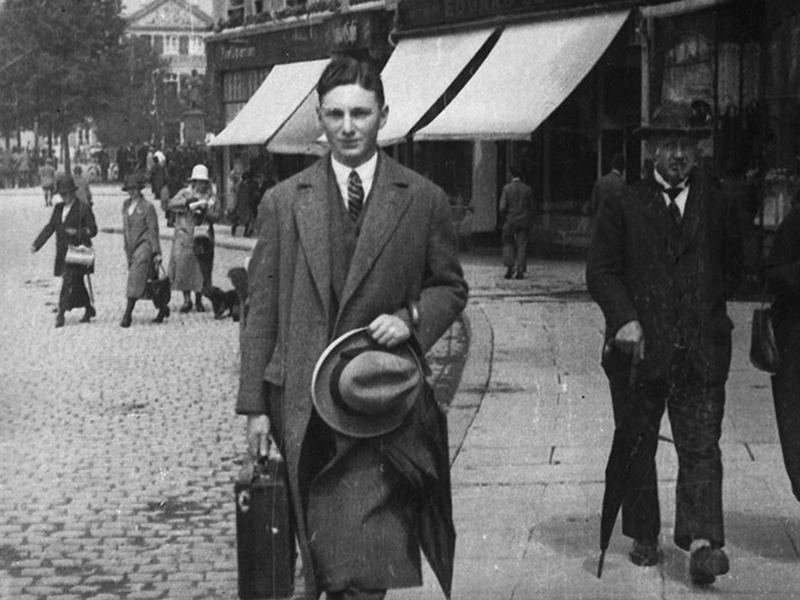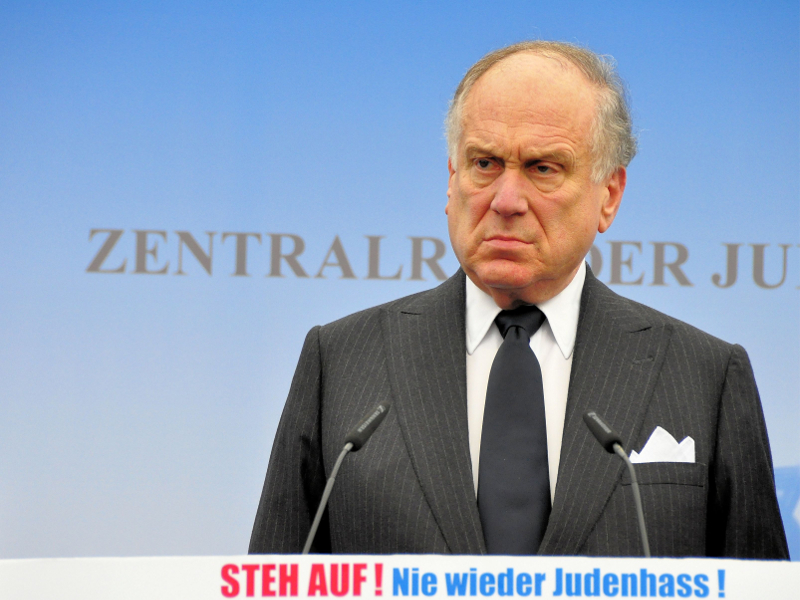World Jewish Congress president Ronald Lauder is urging the City of Duesseldorf, Germany, to reconsider its decision to cancel an exhibition on Max Stern, the Jewish art dealer from the city who lost hundreds of works when the Nazis forcibly confiscated and sold his collection.
In the planning for three years, the exhibition, Max Stern: From Duesseldorf to Montreal, was to open in February at the municipally run Stadtmuseum, when Duesseldorf city council abruptly announced last month that it would not go ahead, due to pending restitution claims on paintings that were once owned by Stern.
Lauder said he was “deeply disturbed” by the decision and rejects the reason behind it.
“The city’s official justification to cancel the exhibit, because victims of Nazi-looted art and their heirs are still looking for their property, is absurd,” said Lauder in a statement on Nov. 29.
Others, including key partners in Montreal, have criticized the decision as an affront to the memory of Stern and his family, who owned a prominent art gallery in Duesseldorf for more than 20 years.
Max Stern, who inherited the business from his father in 1934, was forced out of the trade soon after and had to liquidate more than 200 pieces, many of them valuable works by Old Masters, at a Nazi-authorized auction in Cologne in November 1937, before fleeing the country.
READ: CITY OF DUESSELDORF PULLS THE PLUG ON MAX STERN EXHIBITION
The exhibition would have, at least symbolically, rectified the expunging of the Sterns from the city’s collective memory.
Stern, who died childless in 1987, was the owner of the landmark Dominion Gallery in Montreal and a pioneering promoter of Canadian art. He left the bulk of his estate to McGill and Concordia universities, as well as the Hebrew University of Jerusalem.
Since 2002, Concordia has headed the Marx Stern Art Restitution Project, an international effort that, to date, has recovered only 16 paintings, but has kept the issue of Nazi cultural spoliation – and the resistance of many modern-day Germans to restoring the plunder to its rightful owners – in the public eye.
While the exhibition was being produced by the Stadtmuseum, the Marx Stern Art Restitution Project assisted in its creation and considerable funding come from the Montreal Jewish community. The National Gallery of Canada, which houses the Stern estate, also co-operated on the project.
Lauder noted another exhibition currently on in Bonn, about 75 kilometres away, concerning Cornelius Gurlitt’s huge cache of art – some of it proven to be Nazi-looted – that was discovered in his Munich home in 2012, as proof that such an event can take place, even while victims and their heirs continue to search for what was taken from them.
“As with the Gurlitt exhibit, the Max Stern exhibit should be displayed to increase transparency and educate the public about Nazi-era art theft and provenance research,” he stated.

“Considering the fact that the current German government has made tremendous progress in regard to provenance research, cancelling this exhibit would be a major setback, especially for the victims of the Holocaust and their heirs.”
The Stern exhibit had its genesis in 2014, when the City of Duesseldorf restituted a self-portrait by 19th-century German artist Wilhelm Schadow to the Stern estate. The heirs allowed the painting to continue to hang, on permanent loan, in the Stadtmuseum, which acquired it in 1973.
At that time, then-mayor Dirk Elbers announced an international project on scholarly research into the matter of art restitution, with Concordia as one of the lead partners. His successor, Mayor Thomas Geisel, supports the research, but not an exhibition.
Duesseldorf has stood its ground in the face of mounting criticism from within Germany and abroad.
On Nov. 27, it issued a long-winded explanation of why it scrapped the exhibition, which was to have toured next September to the Haifa Museum in Israel and, in 2019, to Montreal’s McCord Museum.
The planned exhibition was “not able to do justice to … new scientific lines of enquiry relating to Max Stern and his art dealing activities,” the city said in a statement.
Duesseldorf will host an international “scientific” symposium this fall to honour Stern, while addressing “a considerable number of unanswered questions” on claimed works. “A case-by-case analysis” of the provenance of each piece of art must be carried out, the city said.
“The art dealer Max Stern is associated with countless works of art that passed through his hands or are linked with him in a variety of other ways,” it continued.
Last year, Duesseldorf was one of the first German cities to hire a permanent provenance researcher. It plans to publish its report on the status of its research on the Stern art that’s in the city’s possession soon.
The city is inviting experts from museums, universities and other research institutions to participate in the symposium. Their findings may lead to the conception of a new exhibition on Stern.
The city says it will work with the Duesseldorf Jewish community to ensure the symposium is organized “with a high degree of objectivity, sensitivity and prudence.”
Prior to meeting with him, Oded Horowitz, president of the Duesseldorf Jewish community, had been hopeful that Mayor Geisel might change his mind, but in a Dec. 5 email to The CJN, Horowitz said that was not the case.
“Furthermore, we had the impression that the city is blaming Dr. (Susanne) Anna (director of the Stadtmuseum) for producing a concept that they say was not balanced because it was supported by the Max Stern Project experts,” he said.
“It seems that the city is changing its attitude towards restitution and Dr. Anna seems to be too restitution-friendly in their eyes.
“It’s a scandal and I’m very disappointed by the mayor. If we want to achieve any positive result, we have to continue the pressure on the city by the press. I don’t know why the mayor is willing to risk the good name of the city for such an issue, but, as we see, he does.”

